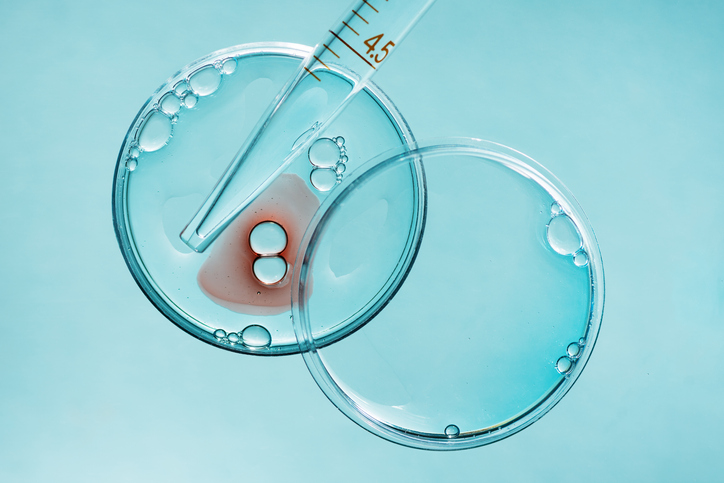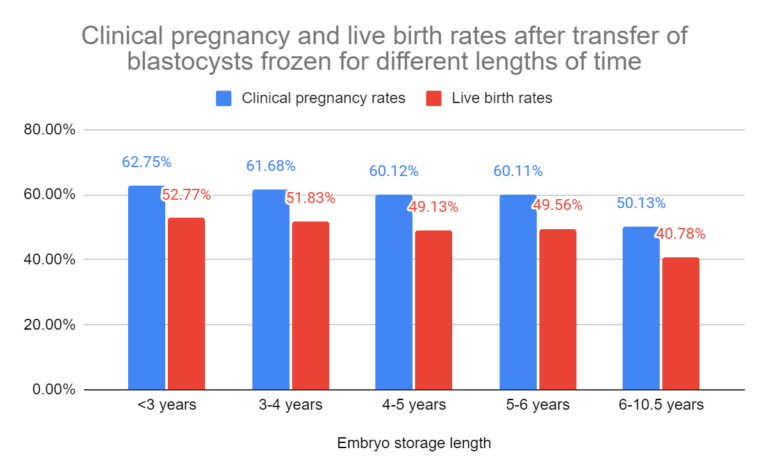Most people going through IVF will have their embryos frozen, so just how long can embryos be frozen for? Put simply: 27 years at least, but probably longer.
Freezing embryos is an essential part of IVF, and not only prevents the waste of excess embryos, but can help to reduce the risk of the potentially life-threatening ovarian hyperstimulation syndrome, or OHSS.
Before we get into how long embryos can be frozen, let’s first talk a bit about how embryos are frozen. Embryos are frozen almost exclusively by a process called vitrification.
What is vitrification?
Vitrification involves freezing embryos so quickly that ice can’t even form. It’s important to avoid creating ice crystals because they can be very sharp and can puncture the cells of the embryo. Instead, the embryo, and the liquid that it’s suspended in, form a glass-like structure during vitrification.
Vitrification involves placing the embryo in a straw or on a stick-like device, and then quickly plunging the embryo into liquid nitrogen. Liquid nitrogen is incredibly cold at -196°C or –320°F, and at these temperatures, there is very little molecular activity that helps to preserve the embryo.
These days, vitrification is the main method for freezing embryos, replacing an older technique called slow freezing. Slow freezing involves fancy equipment and was very time-consuming, typically taking hours to complete instead of a few minutes by vitrification. Plus, vitrification boasts better survival rates and outcomes compared to slow freezing, so vitrification it is!
How long can embryos stay frozen?
Once an embryo is flash frozen by vitrification, the embryo is stored in liquid nitrogen at your IVF facility. In theory, embryos frozen in liquid nitrogen should last for as long as they’re in liquid nitrogen. But whether or not long-term freezing has an impact on their implantation potential isn’t clear.
One study from 2022 compared transfers of nearly 7,000 embryos (blastocysts, or day 5 embryos) that were frozen for up to 10.5 years in liquid nitrogen.
They found that embryos had a decreased survival rate for each year they were frozen (from 93.5% for less than 3 years of storage to 75.3% for more than 6 years of storage). They also found a drop in live birth rates, but this wasn't statistically significant until more than 6 years of storage.
Note that clinical pregnancy and live birth rates weren’t statistically lower until more than 6 years. Source: Remembryo.com
Questions Women Are Asking
On a better note, there were no differences in miscarriage, ectopic pregnancies, or neonatal outcomes.
Other studies, like this one and this one, have found no differences in clinical outcomes with extended embryo storage, while this one did find a difference. There are others too, that find differences or don’t, and the take-home message is that we’re not really sure if there is any effect, and better-designed studies need to be done.
Hypothetically, how might extended storage cause damage to an embryo?
There were a few reasons given by the authors of the above-mentioned studies, including 1) inadequate maintenance of liquid nitrogen storage containers, 2) variability in the competency of embryologists, 3) women who delay transfer might do so because of thin endometrium, or other factors that can influence success rates, or 4) epigenetic changes.
Epigenetic changes involve alterations in the way genes are expressed in our DNA. It’s possible that freezing embryos for a long period of time may induce these changes in a way that compromises clinical outcomes. Of course, more research is needed here!
The researcher from this study concluded that "The mechanism responsible for this dividing line [in embryo storage time] is not yet clear. These results need to be interpreted with attention, and further analyses are indispensable to evaluate the long-term effects after blastocyst vitrification."
What's the longest an embryo has been frozen?


LATESTFeb 19, 2026
Hot Take: We Should Stop Asking People If They’re Done Having Kids
“So are you done having kids?” is pretty much a standard conversational question — like, to the point that it often comes up the... READ MORE
So embryo viability and implantation potential might be compromised with extended embryo storage, but what’s the longest an embryo has been frozen for and resulted in a live birth?
That record currently belongs to Molly Gibson, who was born in 2020 from a donated embryo frozen for 27 years. What's more is that Molly's older sister, Emma, held the previous record at 24 years!
Molly and Emma were certainly some extraordinary embryos, but we can do better! A case report from 2013 reported on live births from semen that were frozen in liquid nitrogen for 40 years!
Is this the limit? Probably not.
In 2021, UK officials proposed legislation to extend the limit eggs, sperm, and embryos could be stored from 10 years to 55 years, which was ultimately approved in 2022. This was based on research by The Royal College of Obstetricians that suggested eggs could be stored indefinitely using modern freezing techniques.
Modern freezing techniques do extend the storage time that embryos can be stored. So the question becomes less of “How long can an embryo be frozen for?” to more a question of “How old is too old for an embryo transfer?”









.jpeg)

.jpeg)

.jpeg)


.jpg)
.jpg)






.png)


